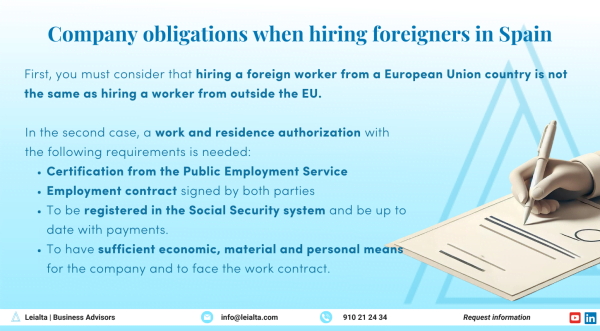
Split payroll, also known as divided payroll or international payroll, is one of the most important issues today for companies with employees working in several countries. Proper management is key to avoiding double taxation, administrative penalties, or errors in contributions for posted workers.
In this article, we will clearly explain what split payroll is, how it differs from shadow payroll, when to apply it, what benefits it brings to both the company and the employee, what legal framework regulates it, and how to manage it effectively without errors.
What is split payroll?
Index of contents
Split payroll refers to the practice of dividing an employee’s salary between different countries. For example, an expatriate employee who remains linked to the company in Spain but carries out part of their work in another European country may receive a percentage of their salary in Spain and another percentage in the destination country.
This ensures that the tax obligations of both territories are met and that social security contributions are distributed as required by law.
Differences between split payroll and shadow payroll
It is true that this mechanism is often confused with shadow payroll, but the difference is significant. In split payroll, the salary is actually paid in several countries, while in shadow payroll, the employee receives their entire remuneration in a single country, and in the other country, a “shadow” payroll is simulated solely for tax and Social Security reporting purposes. Both models pursue the same goal, which is to comply with local regulations, but their application depends on the company’s international mobility strategy and the specific situation of the employee.
When should your company apply split payroll?
Split payroll is recommended in scenarios such as:
- Displaced or expatriate workers who spend part of the year in one country and part in another.
- Employees who contribute in several countries due to legal obligations or the application of bilateral Social Security agreements.
- Organizations with multinational structures that wish to keep part of the salary in local currency and part in foreign currency.
- Cases where it is necessary to avoid double taxation or exchange rate issues.
In short, it is applied when the worker must contribute in several countries or when it is advisable to split the payroll to comply with local regulations.
Benefits of split payroll for companies and employees
One of the most attractive aspects of split payroll is that it generates benefits for both parties. For the company, it means greater control over tax obligations in each country, avoids penalties, and reinforces the image of regulatory compliance, which is essential in organizations that operate internationally. It also provides clarity when auditing international payroll processes, a particularly complex area in times of globalization.
For employees, having a split payroll system provides legal certainty, as it allows them to contribute in the countries where they work and access social benefits without the risk of gaps in their rights. It also facilitates personal tax planning, avoids double taxation, and provides greater financial stability by receiving part of their remuneration in each jurisdiction where they have expenses or tax residence.
Legal and regulatory framework in Spain and the EU
Split payroll must be framed within a network of international and European regulations governing contributions and obligations for posted workers. In the European Union, the main instrument is Regulation (EC) 987/2009, which establishes the rules for coordinating social security systems. This regulation determines in which country a worker providing services in several Member States must pay contributions.
In Spain, one of the most relevant documents is Form TA.201, which is used to request that a posted worker maintain Spanish social security coverage. In addition, bilateral social security agreements signed with third countries play a crucial role, as they clarify where contributions should be made and how to avoid duplication.
In which country should I pay contributions if I work in several countries?
This is one of the most frequently asked questions. And the answer is not uniform, as it depends on the actual time worked in each country, the employee’s tax residence, and whether or not there are bilateral agreements in place.
Implications of split payroll for HR and Finance
Proper management of split payroll requires close coordination between the Human Resources and Finance departments. It is not just a matter of dividing a payroll, but of ensuring that tax withholdings are applied correctly, that exchange rates do not cause distortions, and that accounting accurately reflects payments in different countries.
For HR, the main challenge is to respond to the needs of the posted worker, ensuring that their rights in terms of contributions and social benefits are respected. For Finance, the key is to properly manage the company’s tax burden and cash flow, avoiding penalties and complying with each country’s tax schedules.
An error in the application of split payroll can not only result in financial penalties, but also undermine employee confidence in the organization.
How to manage split payroll step by step
By following a few clear steps, management becomes simple:
- Analyze the situation of the posted worker: country of origin, destination country, length of stay, and applicable agreements.
- Determine the contribution base according to Regulation 987/2009 or bilateral agreements.
- Decide the percentage of the payroll to be paid in each country.
- Calculate and apply tax withholdings and contributions in each jurisdiction.
- Record the split payroll in the HR and accounting systems.
- Perform regular checks to ensure that there are no duplications or non-compliance issues.
In conclusion, split payroll is a key tool for companies with employees in several countries. It facilitates tax and Social Security compliance in different jurisdictions, provides legal certainty, and benefits both the organization and the worker.
However, its management requires a precise knowledge of Regulation 987/2009, bilateral Social Security agreements, and the regulations of each country, as well as close coordination between HR and Finance.
That is why At Leialta we help international companies manage split payroll in Spain, ensuring compliance and reducing risks. Through our labor consulting services, we ensure that all procedures are carried out correctly and that there are no problems with the authorities.




